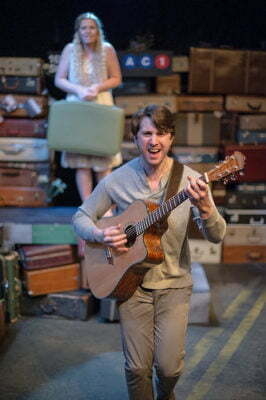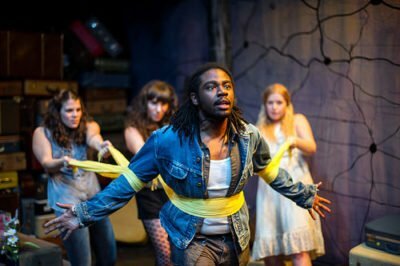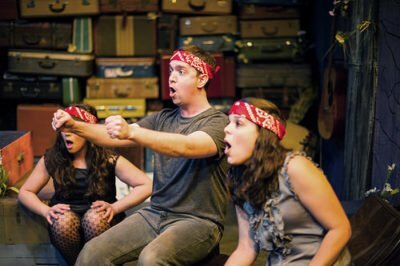Fugitive Songs
Music by Chris Miller
Lyrics by Nathan Tysen
Directed by Zachary L. Gray
Music Direction by Jeffrey Poindexter
Produced by BoHo Theatre
Playing in the Heartland Studio, Chicago
A Life in Motion Still Leaves Time for Reflection
BoHo has been on a bit of a song-cycle kick recently. Like Myths and Hymns and Ordinary Days before it, Fugitive Songs, a 2008 off-Broadway creation by Chris Miller and Nathan Tysen, provides the company with an opportunity to showcase their talented young singers and musicians in a short, easy-to-produce format. The result is a pleasing seventy-five minutes of folk-pop centered on the theme of running away. Though the song-cycle format is more revue than story, director Zachary L. Gray stages each of the nineteen songs as a mini-drama, most of which are cute. True to BoHo’s determination to fully incorporate design into each of their productions, Fugitive Songs is as fun to watch as to listen to. However, “cute” is, for the most part, the extent of this show’s emotional range. Despite Miller and Tysen’s statement that they wrote Fugitive Songs for actors aged 20-40, Gray’s six-person-cast is much younger. Since none of the characters are parents, caregivers, or even have any professional responsibilities, “fugitives” doesn’t seem like quite the right word to describe them starting their own lives.

The first song in the show, “Reasons to Run,” establishes both its modern folk-style and the camaraderie among the cast that is the key component of this staging’s tone. Chicago musical favorite Justin Adair accompanies the cast on a guitar in addition to Jeffrey Poindexter’s keyboard and Justin Akira Kono’s percussion; later on, cast-member Charlotte Morris plays the guitar and the violin. Adair also sings the first solo piece, “Getting There,” about a photographer striking out in the wilderness, with his usual sweet and powerful tenor voice. Greg Foster, whose West Virginian character in “Subway Song” is more of a sad sack, sings with a slightly nasal inflection and an appropriate bluegrass twang. Demi Zaino first demonstrates her comedic skill in “Annie’s Party,” which is about getting stood up by her boyfriend at an important formal event, and her desire to take revenge while decked out in all her finery.

With nineteen songs in total, each cast-member gets several chances to shine. Costume designer Emma Cullimore appears to have designed Charlotte Morris’s fairy-like white dress with her song “Break a Branch” in mind. It is suitable for the song’s poetic natural imagery, Celtic-inspired use of drums, and call-and-response structure. Julian Terrell Otis’s first song is the beat-heavy “Washington Heights,” in which his character marvels that he accidentally wound up spending six years living in the Manhattan neighborhood, and vows to rectify that immediately. Elissa Newcorn possesses control over her volume and considerable vocal quality which makes her as much a leader in the female harmonies as Adair is among the males. Their song “Lullaby,” about a woman’s Greyhound odyssey, is the show’s musical apex.

Fugitive Songs contains enough musical and tonal variation to entertain an audience for the entirety of its brief run-time. The song “Wilson,” about a stoner who unexpectedly becomes accessory to an armed robbery, is both highly comedic and the only one which introduces any real tension. However, Gray’s placement of cast members as silent observers of each other’s tales maintains a reassuring sense of warmth and acceptance throughout the show. Anthony Churchill’s scenic design is an elaborate stack of suitcases, providing Gray with opportunities to create several engaging stage pictures while keeping the stories’ specificity limited to what we are told in the lyrics. Chamber music like Fugitive Songs demands an intimate setting like the Heartland Studio. The charming young cast members are all fit to share the hopeful, nervous atmosphere of exploration and self-discovery with each other, and by extension, an appreciative audience. And they sound good doing it.
Recommended
Jacob Davis
[email protected]
Reviewed February 18, 2016
This show has been Jeff recommended.
For more information, see Fugitive Songs’ page on Theatre in Chicago.
Playing at the Heartland Studio, 7016 N Glenwood Ave, Chicago. Tickets are $25; to order, call 866-811-4111 or visit BoHoTheatre.com. Performances are Thursdays through Saturdays at 8:00 pm and Sundays at 2:00 pm through March 13. Running time is seventy-five minutes with no intermission.

